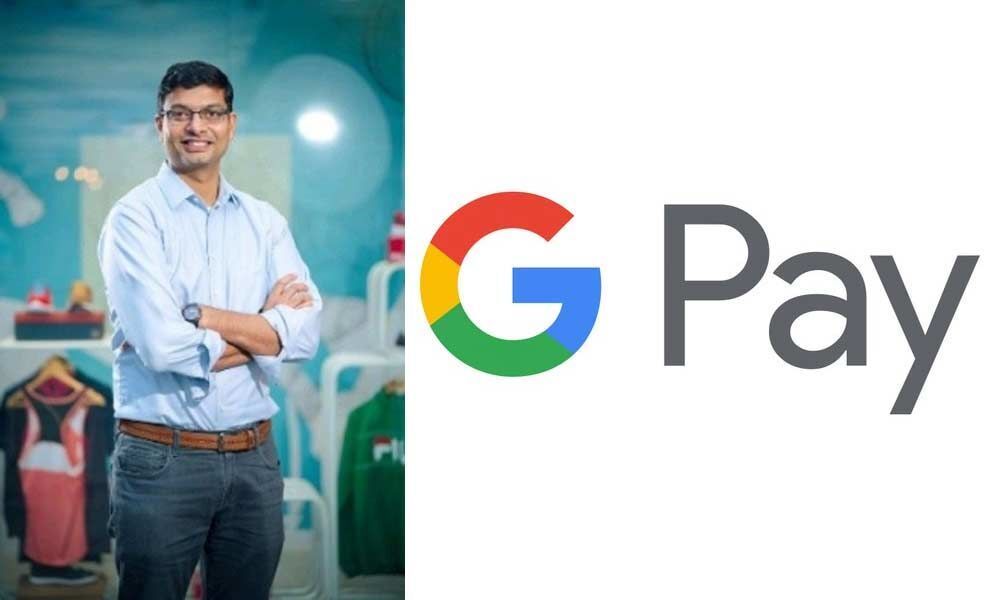Live
- They always want me to win, and now I feel lucky to have been offered a story like ‘Zebra’: Satyadev Kancharana
- ‘Democracy first, humanity first’: PM Modi in Guyana's parliament on two countries' similarities
- PKL Season 11: Telugu Titans register third straight win to top standings
- Is Pollution Contributing to Your COPD?
- NASA Unveils Underwater Robots for Exploring Jupiter's Moons
- Additional Central forces arrive in violence-hit Manipur
- AR Rahman and Saira Banu’s Divorce: Legal Insights into Common Issues in Bollywood Marriages
- 82.7 pc work completed in HPCL Rajasthan Refinery area: official
- Curfew relaxation extended in 5 Manipur districts on Friday
- Tab scam prompts Bengal govt to adopt caution over fund disbursement
Just In
Google Pay sets eyes on 12mn Kirana stores in India


Google Pay which reported 55 million monthly active users in India in May has set eyes on tapping over the ubiquitous Kirana stores -- nearly 12 million in numbers -- to write its next growth story in the country, a top company executive said on Wednesday.
New Delhi: Google Pay which reported 55 million monthly active users in India in May has set eyes on tapping over the ubiquitous Kirana stores -- nearly 12 million in numbers -- to write its next growth story in the country, a top company executive said on Wednesday.
According to Ambarish Kenghe, Director, Product Management, Google Pay, India, more and more people are embracing Google Pay and the aim is to tap into the small and medium businesses (SMBs) and the neighbourhood Kirana stores, thus empowering both the merchants and the consumers go digital in a seamless and secure way.
"The idea is to empower more Indians as digital becomes new cash for millions in the country. The Unified Payments Interface (UPI) helps you pay at the neighbourhood Kirana store and after leading the peer-to-peer (P2P) digital payments market, peer-to-merchant (P2M) market is we are currently looking into," Kenghe told IANS.
Nearly 90 per cent of the retail market in the country is currently unorganised -- a market that, if goes digital in coming years, will open new avenues for the digital payments firms.
India recorded an accelerated growth rate of over 50 per cent in the volume of retail electronic payment transactions in the last four years, according to the latest report by the Reserve Bank of India (RBI). The growth in 2018-19 was largely due to the steep growth in Unified Payments Interface (UPI)-based digital payments.
According to an Assocham-PWC study, digital payments in India will more than double to $135.2 billion in 2023 from $64.8 billion this year with a compounded annual growth of 20.2 per cent.
With the spurt in smartphone users (the country has over 450 million smartphone users), digital payments and e-wallet companies are in for some fierce competition and with WhatsApp Pay arriving soon, the game will only become intense.
Google Pay currently has over 3,000 online merchants including Zomato, BookMyShow, Swiggy, RedBus and others in its kitty while it is accepted at over 200,000 offline stores across 3,500 towns and cities. Some of the leading names include Reliance Stores and Vishal Mega Mart, etc.
Google Pay (as of May) had $95 billion in money value passing through the channel, at an annualized run rate (ARR) level.
According to Kenghe, the digital payments landscape in India has changed in the last two-three years, especially with the growing smartphone user base.
"In the last two years, instant bank-to-bank transfers via UPI have become the preferred form of payment for millions of Indians, with many users adopting digital payments for the first time," he said.
Google Pay has already made inroads into smaller towns and two-third of its business in India is coming from such markets.
To keep the transactions extra-secure, Google Pay now sends app notifications as well as SMSes to inform users each time they receive a collect request to highlight that approving the request will deduct money from their bank accounts.
"We are mindful that at Google Pay, users are entrusting us with their most sensitive asset - their money. We are conscious of the responsibility that comes with this trust," Kenghe noted.
Google Pay uses Machine Learning (ML)-based scam prevention models, and also displays explicit "scam" or "stranger" warnings if a user receives a request from someone suspicious or not in their contacts.
"The whole idea is to empower our users in India not just with making payments but to do that in a seamless and secure way," the Google Pay executive added.
(Nishant Arora can be reached at [email protected])

© 2024 Hyderabad Media House Limited/The Hans India. All rights reserved. Powered by hocalwire.com






